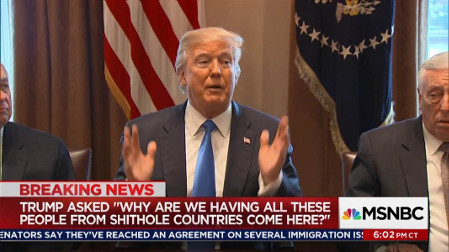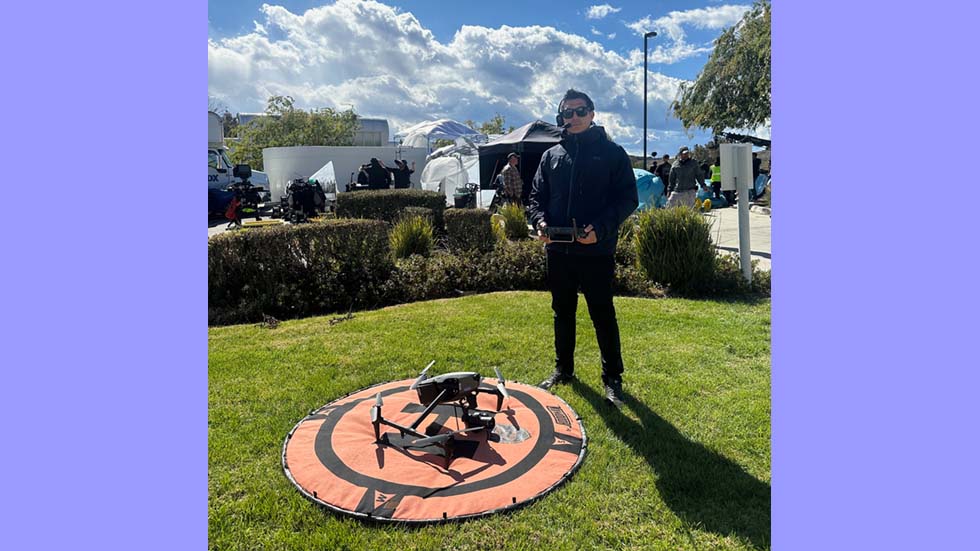Trump Forces Broadcasters to Re-Assess Profanity Policies
WASHINGTON—Forty years after the U.S. Supreme Court established guidelines for saying profanities over the airwaves, broadcasters are dealing with a new challenge that has very little precedent: How to treat such utterances when they come from the president of the United States.

In 1978, the court ruled in the infamous “seven dirty words” case after the FCC issued a fine against a radio station that aired the George Carlin sketch. While in some ways, the court’s decision established indecency guidelines, it also opened the door for an evolution of sorts for how radio and television broadcasters—who are bound by FCC rules—handle such incidents.
President Trump’s recent alleged use of the word “shithole” during a White House meeting with senators forced news organizations to decide whether or not to repeat the profanity during news reports. The approaches were varied and nuanced.
CNN, NBC and MSNBC didn’t mince words, repeating the president’s profanity as breaking news, while ABC News, Fox News and CBS used variations of “sh*thole,” “s**thole,” and “S-hole” on the air and on their chyrons. NBC warned its viewers prior to airing its news segments covering the controversy as did NPR.
According to FCC rules, broadcast networks are prevented from airing indecent or profane material between 6-10 p.m. The FCC defines such indecent material as "grossly offensive language that is considered a public nuisance," with the caveat that mitigating factors include "the specific nature of the content, the time of day it was broadcast and the context in which the broadcast took place."
“Context” is the key word in the debate. As a rule, news organizations report (and parse) every word the president says, so if he used a profanity in describing other nations during a meeting with legislators, is that considered “newsworthy?”
“The FCC has said repeatedly that there is no blanket rule exempting news programming from its indecency rules—so theoretically, a broadcaster could face an indecency action at the FCC for the use of a proscribed word on the air, even in a newscast,” said David Oxenford on Broadcast Law Blog. “However the FCC has recognized that decisions made about the language used in newscasts are subject to a different level of First Amendment protection than language that might be included in an entertainment program.”
Get the TV Tech Newsletter
The professional video industry's #1 source for news, trends and product and tech information. Sign up below.
For now, the news media has decided that it is newsworthy. The FCC has received several complaints, according to Broadcasting and Cable, but the commission has not commented any further on the issue.
A lot has changed since 1978, including what is considered acceptable language on television and in polite society. What used to be considered “locker room talk” (which candidate Trump alluded to when referring to the infamous “Access Hollywood” scandal) may not be so controversial anymore.
“It’s part of the general culture change, I guess,” Ben Zimmer, a Wall Street Journal columnist told the Washington Post. “Certainly over the last 50 years, profanity or taboo terms have gained more mainstream acceptance than actually see or printed in places, where they previously wouldn’t be considered allowed.”
Nevertheless, despite the fact that the FCC has provided more discretion on profanity rules during newscasts, broadcasters should not take anything for granted.
“With FCC Chairman Pai admonishing broadcasters to ‘keep it clean,’ and with the FCC’s indecency rules still on the books, and any complaint likely to cost time and money to defend,” writes Oxenford, “broadcasters may want to be cautious in their approach to these situations, even in the context of news programs.”
Tom has covered the broadcast technology market for the past 25 years, including three years handling member communications for the National Association of Broadcasters followed by a year as editor of Video Technology News and DTV Business executive newsletters for Phillips Publishing. In 1999 he launched digitalbroadcasting.com for internet B2B portal Verticalnet. He is also a charter member of the CTA's Academy of Digital TV Pioneers. Since 2001, he has been editor-in-chief of TV Tech (www.tvtech.com), the leading source of news and information on broadcast and related media technology and is a frequent contributor and moderator to the brand’s Tech Leadership events.

